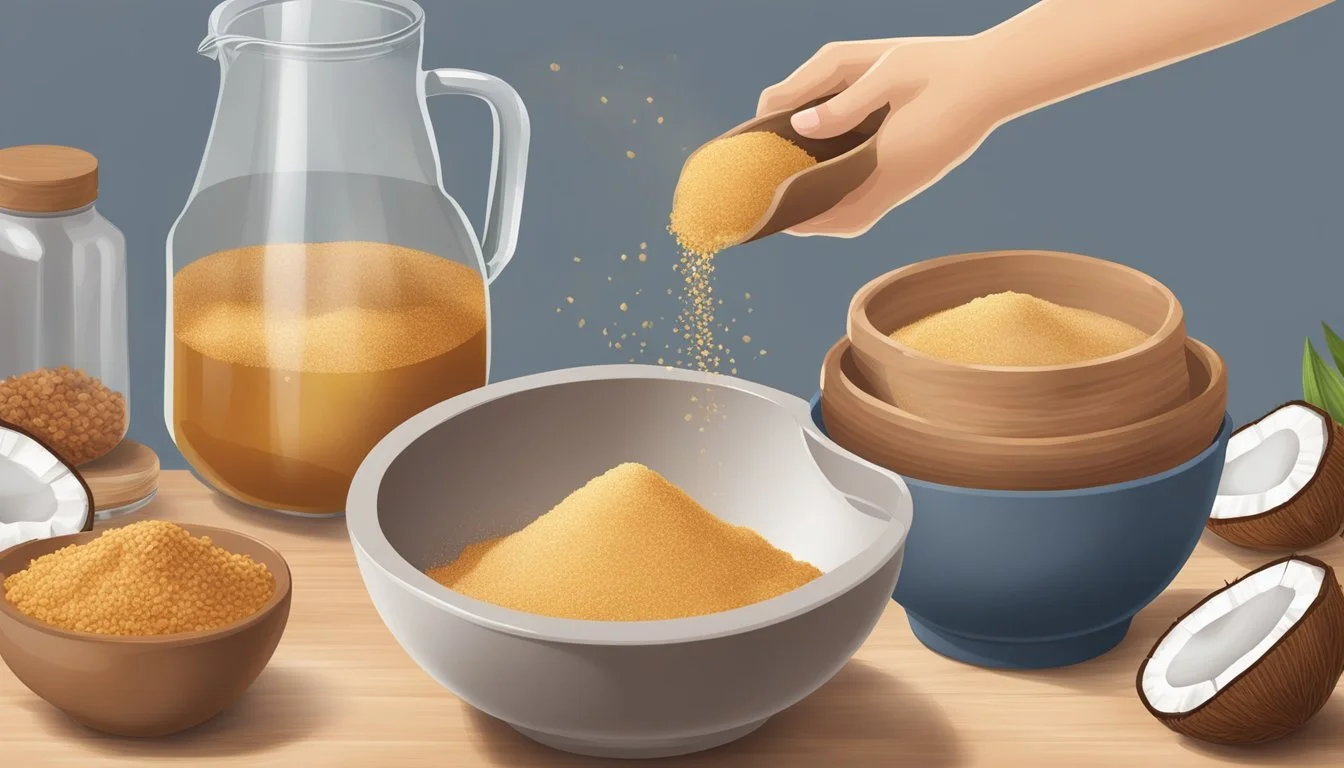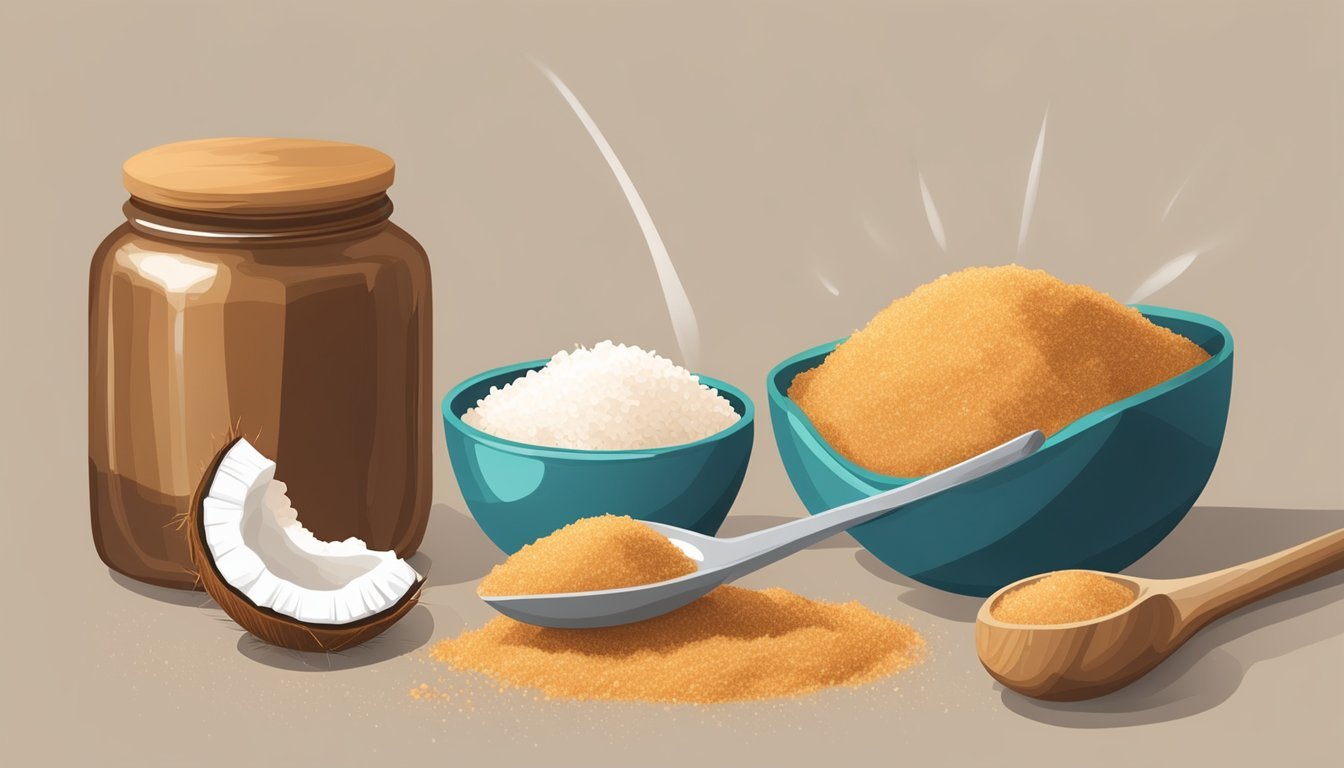How to Substitute Coconut Sugar for Cane Sugar
Easy Conversion Tips
Coconut sugar is becoming a popular alternative to traditional cane sugar in baking and cooking. With its lower glycemic index and more complex flavor profile, it offers a different set of characteristics when compared to cane sugar. Derived from the sap of the coconut palm, coconut sugar presents a molasses-like flavor akin to brown sugar, which adds a unique depth to recipes. It is important for those considering the substitution to understand how coconut sugar behaves in comparison to cane sugar to achieve the desired outcomes in their culinary creations.
When substituting coconut sugar for cane sugar in recipes, it can often be done on a one-to-one ratio. Coconut sugar's granular composition is similar to that of granulated cane sugar, which allows for straightforward measurement conversions. However, coconut sugar's reduced sweetness may lead some to adjust the amount used, potentially reducing the quantity by up to 25 percent without altering the texture or structure of the baked goods. Its rich, caramel taste can enrich the flavor profile of the recipe, making it not only a substitute but also a complement to many dishes.
The nutritional content of coconut sugar offers a slightly better profile than cane sugar, with minor amounts of nutrients such as zinc, iron, and calcium. These differences, while not enough to label coconut sugar as a health food, may be a consideration for those looking for an alternative sweetener. Both types of sugar contribute similar caloric and carbohydrate content, so the choice between coconut and cane sugar often comes down to personal preference and desired flavor outcomes in baking and cooking.
Understanding Sugar Types
When substituting coconut sugar for cane sugar, it's important to understand their distinct attributes and how different sugar alternatives can affect your recipes. Each type of sugar and sweetener imparts unique flavors and properties to baked goods and dishes.
Attributes of Cane Sugar
Cane sugar, derived from the sugarcane plant, is predominantly available in two forms:
White Sugar: Pure sucrose, refined to eliminate molasses, providing a neutral sweet flavor.
Brown Sugar: Contains molasses, offering a richer, caramel-like flavor.
White sugar is the standard sweetener in many recipes due to its consistent texture and flavor. Brown sugar, often used in baking, contributes moisture and a deep, complex taste.
Benefits and Drawbacks of Coconut Sugar
Coconut sugar, made from the sap of the coconut palm, presents several points for consideration:
Benefits:
Lower glycemic index than cane sugar.
Retains trace amounts of minerals.
Profound flavor, similar to that of brown sugar with notes of caramel.
Drawbacks:
Less sweet than cane sugar, adjustments may be needed.
Variability in flavor can affect the recipe's outcome.
Coconut sugar's health-related benefits are often highlighted, though it should still be consumed in moderation.
Sugar Alternatives Overview
Various sweeteners can stand in for cane sugar, each bringing a specific profile:
Honey: A natural sweetener that is sweeter than sugar and adds distinct floral notes.
Maple Syrup: Derived from the sap of maple trees, it provides a unique woodsy sweetness.
Molasses: A byproduct of refining cane sugar, it offers robust flavor, ideal for rich baked goods.
Turbinado Sugar: Less processed with a light caramel flavor, often used as a more natural alternative.
Sucralose: An artificial sweetener that's significantly sweeter than sugar and used in less quantity.
As one moves from traditional cane sugar to other alternatives like maple syrup or molasses, the impact on texture, flavor, and sweetness levels must be taken into account.
Nutritional Comparison
When comparing coconut sugar to cane sugar, it is important to consider differences in their glycemic index, caloric content, sweetness levels, and nutritional benefits in terms of mineral and fiber content.
Glycemic Index Discussion
The glycemic index (GI) is a measure that ranks foods according to their effect on blood glucose levels. Coconut sugar has a lower GI when compared to cane sugar. This is due to the presence of inulin, a type of dietary fiber found in coconut sugar which slows glucose absorption. Conventional cane sugar has a GI of around 65, whereas coconut sugar typically has a GI of approximately 54.
Caloric Content and Sweetness Levels
Both sweeteners provide similar caloric content, with about 16 calories per teaspoon. However, coconut sugar is slightly less sweet than cane sugar, which may necessitate using more to achieve the same sweetness level, potentially leading to increased calorie consumption if used in larger quantities.
Mineral and Fiber Content
While both types of sugar are not significant sources of nutrients, coconut sugar does contain trace amounts of minerals and fiber. Here are some specifics:
Minerals: Coconut sugar includes small amounts of iron, calcium, potassium, zinc, and magnesium.
Fiber: It also contains a minimal amount of fiber due to the inulin content.
Vitamins: There is a nominal contribution when it comes to vitamins and antioxidants.
On the contrary, cane sugar lacks these additional nutrients and offers no measurable fiber or mineral benefits. Therefore, while neither sweetener should be relied upon as a health food or significant nutrition source, coconut sugar offers a slight edge in this comparison.
Baking and Cooking with Coconut Sugar
When substituting coconut sugar for cane sugar, a baker must consider its distinct impact on texture, taste, and appearance of the final product.
Impact on Texture and Consistency
Coconut sugar tends to absorb more liquid due to its coarser texture, which may affect the moisture content of baked goods. Bakers may need to slightly increase the wet ingredients to achieve a comparable consistency to products made with cane sugar. For example, in a cookie recipe, they may want to add an extra tablespoon of butter or a splash of milk to counter the dryer texture coconut sugar can impart.
Taste and Flavor Profile Adjustment
Although coconut sugar can directly replace cane sugar in a 1:1 ratio, its flavor profile is notably different—it offers a caramel-like taste compared to cane sugar's more neutral sweetness. This characteristic is usually a welcome addition in items such as pastries and cookies, where a deeper, more complex flavor is desirable. However, in delicately flavored dishes, the robust taste of coconut sugar should be accounted for during the recipe adjustment.
Color and Appearance Considerations
In terms of color, coconut sugar causes baked goods to darken more than if they were prepared with white cane sugar. This natural caramel hue can enhance the visual appeal of some baked items, giving them a rich, inviting color. Bakers should consider this when aesthetic presentation is crucial, such as in lighter-colored cakes or icings, where the darker color may not be as appealing.
Substitution Guidelines
When substituting coconut sugar for cane sugar, one needs to consider the key aspects: the ratio for substitution, adjustments in recipe quantities and liquidity, and potential alternative sweeteners. Below are specific guidelines for making these substitutions effectively.
Basic Conversion Ratios
For basic conversions, coconut sugar can generally replace granulated sugar in a 1:1 ratio. However, because coconut sugar has a lower sweetness profile, one may consider increasing the amount by up to 25% for a closer match in sweetness.
Adjusting Quantities and Liquidity
In baking, the substitution may alter the moisture content. Since coconut sugar can add more moisture to a recipe, adjustments may need to be made. For instance, if using a liquid form of sweetness like honey or maple syrup as a coconut sugar substitute, reduce other liquids in the recipe to maintain the desired consistency.
Alternative Sweeteners as Substitutes
When looking for substitutes for cane sugar, several alternative natural sweeteners may be used. For example:
Brown sugar: Substitutes on a 1:1 basis and adds a molasses flavor.
Honey: Use in a lesser amount due to its greater sweetness. A 1:4 ratio (honey to coconut sugar) is suggested, adjusting liquids in the recipe as necessary.
Maple syrup: This liquid natural sweetener can replace coconut sugar but, like honey, should also be in a reduced amount with liquid adjustments to the recipe.
These guidelines will aid in maintaining the taste and texture of your dish when using coconut sugar or its substitutes.
Exploring Common Substitutes
When seeking alternatives for coconut sugar, it is essential to understand the nature and behavior of potential substitutes to ensure they complement your recipes appropriately. This section delves into various natural sweeteners that can be used in place of coconut sugar, focusing on their distinct qualities and usage recommendations.
Monk Fruit and Stevia Comparison
Monk fruit sweetener and stevia are high-intensity sweeteners derived from natural sources. Monk fruit, also known as Luo Han Guo, originates from a fruit native to Southeast Asia and exhibits a sweetness 150-200 times that of cane sugar, with negligible calories. It maintains stability under high temperatures, making it suitable for baking.
In contrast, stevia is extracted from the leaves of the Stevia rebaudiana plant, native to South America. Stevia's sweetness can be 200-300 times sweeter than sugar, and like monk fruit, it is also non-caloric. When substituting in recipes, they both should be used in far smaller quantities due to their intense sweetness, and careful adjustments to other recipe components might be necessary to maintain the desired texture.
Maple and Agave Syrup Varieties
Alternatives to coconut sugar that come in liquid form include maple syrup and agave syrup. Maple syrup, made from the sap of maple trees, imparts a rich, distinctive flavor and is approximately three times as sweet as cane sugar. It can replace coconut sugar in a 3:4 ratio, that is, ¾ cup of maple syrup for every 1 cup of coconut sugar.
Agave syrup, derived from the agave plant, offers a milder flavor and is about 1.5 times sweeter than sugar. It can be used in a 2:3 ratio, meaning ⅔ cup of agave syrup for every 1 cup of coconut sugar. Both syrups add moisture to baked goods, so other liquid ingredients in recipes may need to be reduced accordingly.
Molasses-Based Options
Products derived from molasses, such as natural molasses and sucanat (a less processed version of cane sugar retaining some of the molasses), can serve as effective substitutes for coconut sugar. Natural molasses adds a robust, bittersweet flavor and is best used in rich recipes like gingerbread or brownies. Its substitution ratio for coconut sugar is typically 1:1, but this may vary based on the desired sweetness and moisture balance in the final product.
Sucanat, with its granulated form and molasses flavor, matches well with the caramel notes of coconut sugar. Suitable for direct substitution in a 1:1 ratio, sucanat can seamlessly replace coconut sugar in most recipes, from baking to beverages.
Practical Tips and Tricks
When substituting coconut sugar for cane sugar, one should consider storage, brand variations, and alternative culinary uses to achieve the best results.
Storage and Shelf Life
Coconut sugar:
Storage: It should be stored in an airtight container to prevent moisture from clumping the sugar.
Shelf Life: Properly stored coconut sugar can last up to two years, maintaining quality and flavor.
Storage: This sugar also requires an airtight container, keeping it away from moisture and other contaminants.
Shelf Life: It has a longer shelf life and can last indefinitely, but it's best used within two years for optimal taste.
Brands and Quality Variations
When selecting coconut sugar, look for brands that specify they offer "unrefined" or "raw" options, as these are less processed. The quality can vary between brands, so one may want to experiment with a few to find a preference. For cane sugar alternatives, one can choose among raw sugar, light brown sugar, or dark brown sugar, each providing a slightly different flavor and moisture content.
Culinary Applications Beyond Baking
Coconut sugar is versatile and can be used in:
Sauces and glazes for a subtle, caramel-like sweetness.
Beverages as a sweetening agent, dissolving similarly to traditional sugars.
Cane sugar, on the other hand, is widely used in:
Candies and sweets due to its consistent melting properties.
Preserves and pickles, where it can act as a preservative and flavor enhancer.
By considering these factors, one can confidently substitute coconut sugar for cane sugar while maintaining the desired outcome of their culinary creations.
Frequently Asked Questions
This section addresses common inquiries related to substituting coconut sugar for cane sugar, touching on health concerns, diet and weight management implications, and tips for selecting the best substitute to meet individual dietary needs.
Addressing Health Concerns
When it comes to health, coconut sugar is often seen as a healthier alternative to cane sugar, primarily due to its slightly lower glycemic index which may lead to a less immediate spike in blood glucose levels. It's important to note, however, that coconut sugar still contains fructose and glucose, and the impact on one's health should be considered in the context of overall diet and moderation.
Usage in Diet and Weight Management
For those managing their weight or dietary intake, the replacement of cane sugar with coconut sugar should be done judiciously. One might consider alternatives like erythritol, a natural sweetener with almost zero calories. Artificial sweeteners like sucralose could also be an option, but they may not be suitable for all recipes due to their intense sweetness and potential aftertaste.
Finding the Right Substitute for Your Needs
Choosing a substitute for coconut sugar depends on individual taste preference and cooking requirements. Listed below are some common coconut sugar substitutes and their characteristics:
Substitute Flavor Note Sweetness Notes Turbinado sugar Slight caramel Similar to cane Can replace coconut sugar 1:1 in recipes. Maple sugar Distinctive maple Less sweet Granulated form of maple syrup, suitable for baking. Sucralose No specific flavor note Much sweeter Use sparingly due to high sweetness level.
Incorporating natural or artificial sweeteners should be based on the desired outcome in both flavor and nutritional content.




